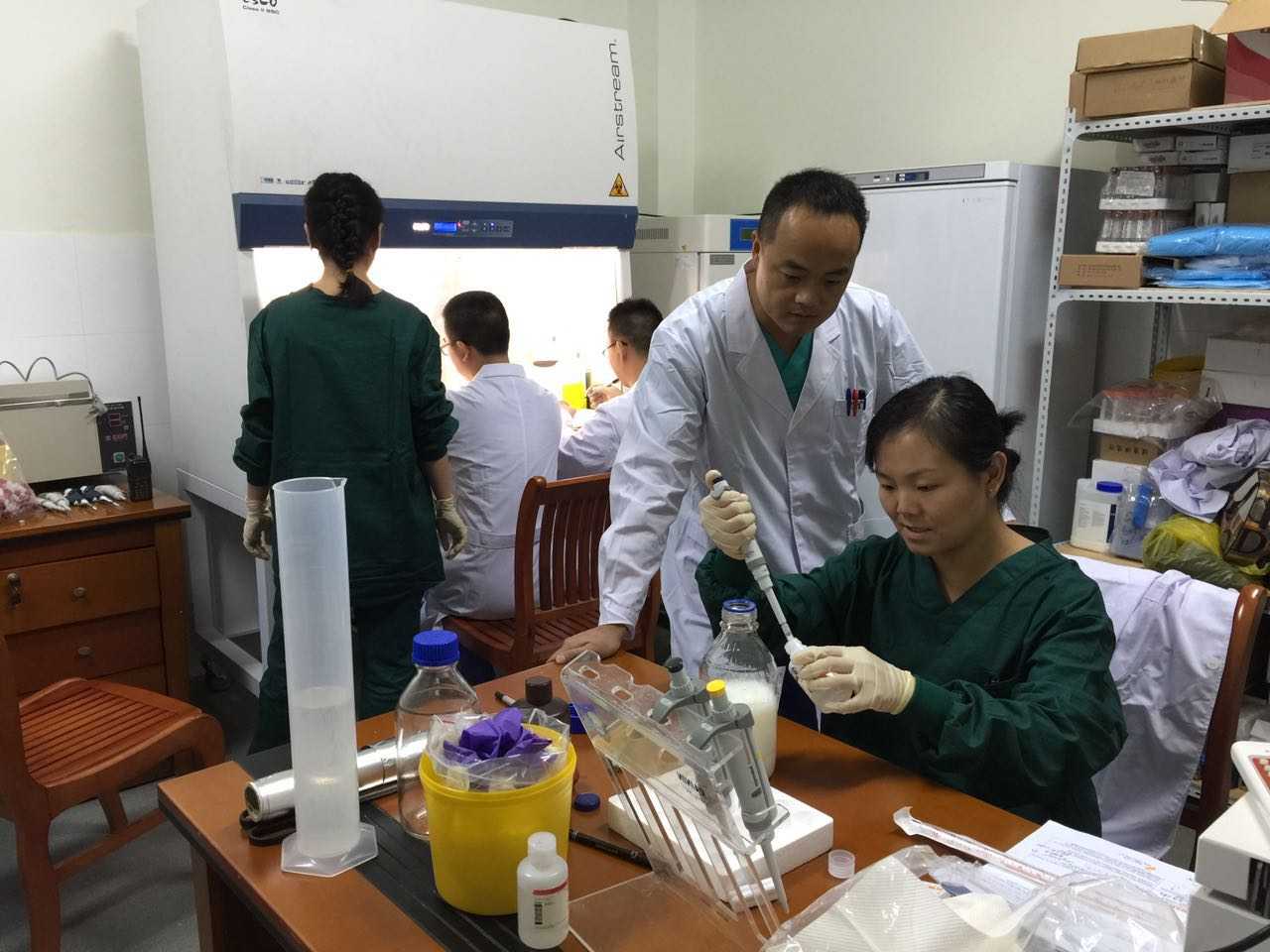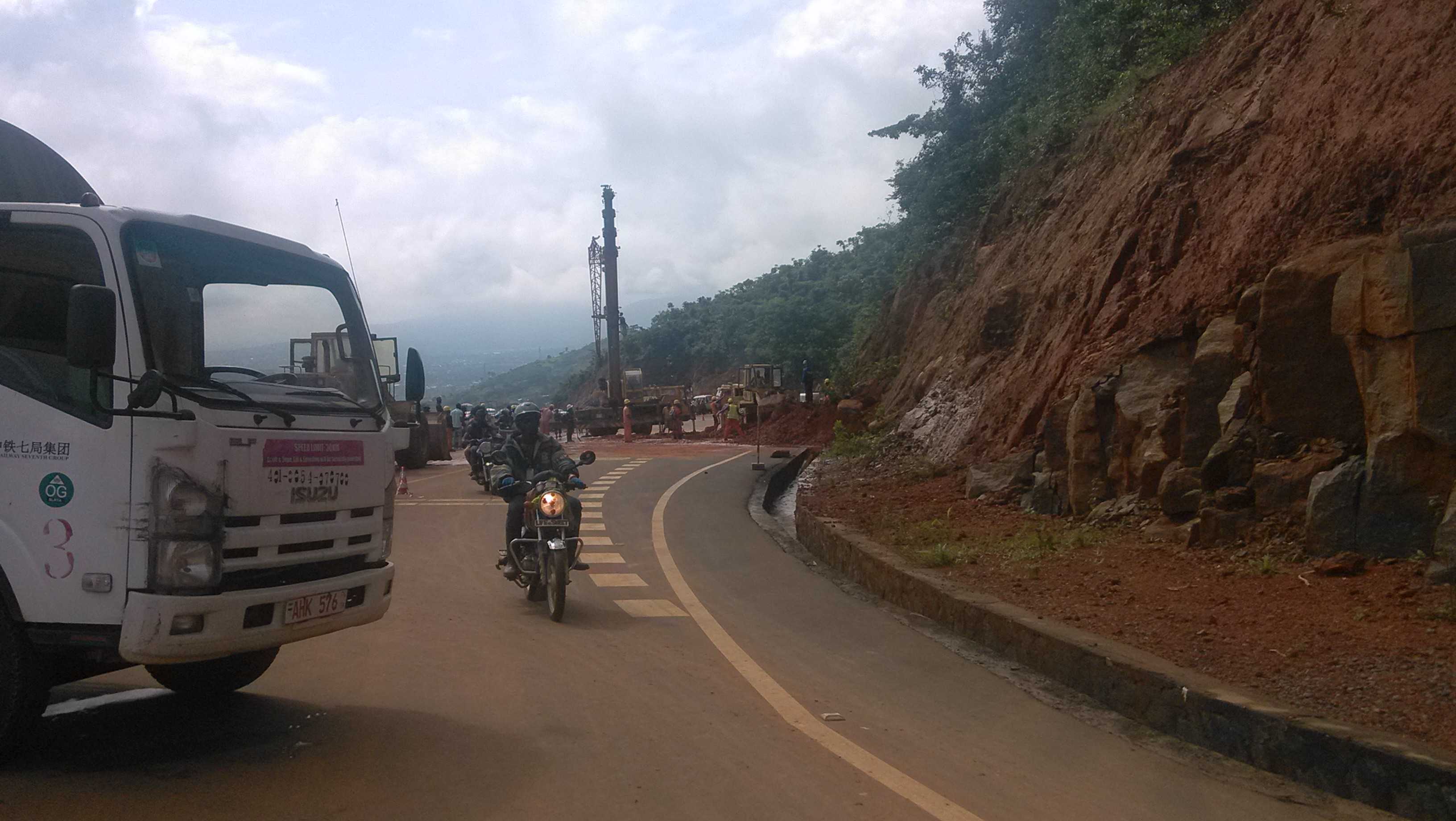Global Disease Detection Stories: Disease Diplomacy—From China to Atlanta to Sierra Leone
As Chinese nationals, Drs. ShuYu Wu and Yuzhi Zhang were uniquely able to cross language and travel barriers to bring a needed laboratory technique to West Africa.

Yuzhi and ShuYu show laboratory staff how to perform the diagnostic test.
Neither Dr. ShuYu Wu nor Dr. Yuzhi Zhang—laboratory experts from the U.S. Centers for Disease Control and Prevention (CDC) Global Disease Detection program in China—had ever been to Africa or worked on an international outbreak response before. But after hearing from colleagues who had deployed to West Africa to help stop Ebola, the two scientists didn’t want to pass up the opportunity to make a contribution. They were scheduled to arrive in Sierra Leone in mid-September 2014. First, they would have to travel all the way from China to CDC headquarters in Atlanta, GA, to get vital training and equipment.
A unique task
At the beginning of the outbreak, laboratories in Sierra Leone needed better techniques to detect cases of Ebola. Experts at the U.S. CDC in Atlanta had a laboratory technique that would help. This is where ShuYu and Yuzhi stepped in.
Their task was to bring the CDC diagnostic test for Ebola to the new Biological Safety Laboratory at the Jui Hospital in Sierra Leone. The Jui labratory was built by the Chinese government and staffed with Chinese-speaking scientists from the China Center for Disease Control and Prevention (China CDC), which performs many of the same functions as the U.S. CDC. As Chinese nationals, ShuYu and Yuzhi were able to cross language and travel barriers to quickly get needed supplies and training to the Chinese laboratory.
The journey before the journey
The diagnostic test that ShuYu and Yuzhi were bringing to the Jui lab requires specialized training to perform. Before going to Sierra Leone, the two scientists traveled to Atlanta to be trained by Ebola experts working in CDC’s Viral Special Pathogens lab.

On the road in Sierra Leone.
While in Atlanta, ShuYu and Yuzhi kept in close contact with the Chinese laboratorians in Sierra Leone to discuss the training, equipment, and reagents – specific chemical compounds necessary for analysis – that would be needed to carry out the diagnostic tests. “We held teleconferences with China’s Jui lab to check with them on every piece of equipment and the reagents that they had on hand. We then discussed with CDC in Atlanta what, if any, modifications we could make to the test if certain equipment and reagents were not available at the Jui laboratory,” said Yuzhi.
Making do and getting results
Armed with specialized training and hours of interaction with the Jui laboratory, the two set off for Sierra Leone.
Even with all the preparation and support they received in Atlanta, they still faced challenges when they arrived in Sierra Leone. Sierra Leone has limited resources and safe water is scarce. ShuYu and Yuzhi found that basic laboratory equipment like pipettes and test tubes were hard to find. Even basic services failed them. Yuzhi said, “We encountered power outages almost every day.” ShuYu and Yuzhi improvised and developed a revised laboratory protocol with the equipment available to them.
On a typical day during their deployment, they spent about 8 hours in the Jui lab working side-by-side with China CDC laboratorians, training them on how to use the revised test. Every night, they communicated with colleagues at the Viral Special Pathogens laboratory in Atlanta to discuss the day’s results and problems and troubleshoot for the next day. It wasn’t long before the test worked as planned.
A rewarding collaboration
“Working together and sharing experiences helps improve trust and collaboration between the United States and China.”
Though separate entities, a strong partnership exists between China CDC and the U.S. CDC, and the GDD program serves as an example of how the two institutions work together. Since the GDD program began in 2006, Chinese laboratorians have worked alongside American colleagues to build greater diagnostic testing capacity throughout China. Few would have imagined that, when this collaboration began, lab experts from both countries would also be traveling across the world to offer critical training and resources to Sierra Leone to help stop the spread of the largest outbreak of Ebola in history.
The two scientists agree that the deployment was a rewarding experience. The challenges in bringing needed laboratory tests to Sierra Leone added to ShuYu and Yuzhi’s understanding of the important role scientists can play in establishing relationships between countries. “Working together and sharing experiences helps improve trust and collaboration between the United States and China,” Yuzhi said.
Training and equipment was supported by CDC’s Viral Special Pathogens Branch in partnership with China CDC. Drs. ShuYu Wu and Yuzhi Zhang work at the GDD Center in China, which is part of CDC’s country office. National laboratory capacity is one of the key goals of the Global Health Security Agenda.
- Page last reviewed: December 11, 2015
- Page last updated: December 11, 2015
- Content source:


 ShareCompartir
ShareCompartir